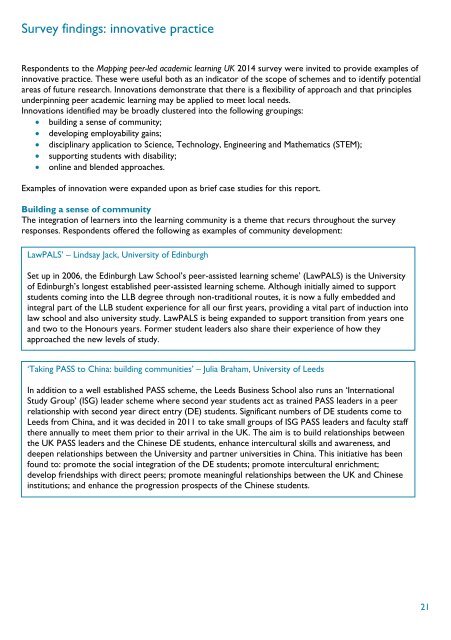Peer_led_learning_Keenan_Nov_14-final
Peer_led_learning_Keenan_Nov_14-final
Peer_led_learning_Keenan_Nov_14-final
You also want an ePaper? Increase the reach of your titles
YUMPU automatically turns print PDFs into web optimized ePapers that Google loves.
Survey findings: innovative practiceRespondents to the Mapping peer-<strong>led</strong> academic <strong>learning</strong> UK 20<strong>14</strong> survey were invited to provide examples ofinnovative practice. These were useful both as an indicator of the scope of schemes and to identify potentialareas of future research. Innovations demonstrate that there is a flexibility of approach and that principlesunderpinning peer academic <strong>learning</strong> may be applied to meet local needs.Innovations identified may be broadly clustered into the following groupings: building a sense of community; developing employability gains; disciplinary application to Science, Technology, Engineering and Mathematics (STEM); supporting students with disability; online and blended approaches.Examples of innovation were expanded upon as brief case studies for this report.Building a sense of communityThe integration of learners into the <strong>learning</strong> community is a theme that recurs throughout the surveyresponses. Respondents offered the following as examples of community development:LawPALS’ – Lindsay Jack, University of EdinburghSet up in 2006, the Edinburgh Law School’s peer-assisted <strong>learning</strong> scheme’ (LawPALS) is the Universityof Edinburgh’s longest established peer-assisted <strong>learning</strong> scheme. Although initially aimed to supportstudents coming into the LLB degree through non-traditional routes, it is now a fully embedded andintegral part of the LLB student experience for all our first years, providing a vital part of induction intolaw school and also university study. LawPALS is being expanded to support transition from years oneand two to the Honours years. Former student leaders also share their experience of how theyapproached the new levels of study.‘Taking PASS to China: building communities’ – Julia Braham, University of LeedsIn addition to a well established PASS scheme, the Leeds Business School also runs an ‘InternationalStudy Group’ (ISG) leader scheme where second year students act as trained PASS leaders in a peerrelationship with second year direct entry (DE) students. Significant numbers of DE students come toLeeds from China, and it was decided in 2011 to take small groups of ISG PASS leaders and faculty staffthere annually to meet them prior to their arrival in the UK. The aim is to build relationships betweenthe UK PASS leaders and the Chinese DE students, enhance intercultural skills and awareness, anddeepen relationships between the University and partner universities in China. This initiative has beenfound to: promote the social integration of the DE students; promote intercultural enrichment;develop friendships with direct peers; promote meaningful relationships between the UK and Chineseinstitutions; and enhance the progression prospects of the Chinese students.21


